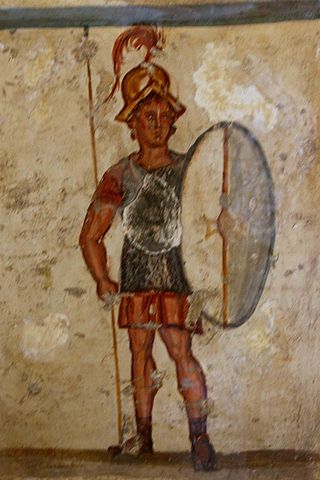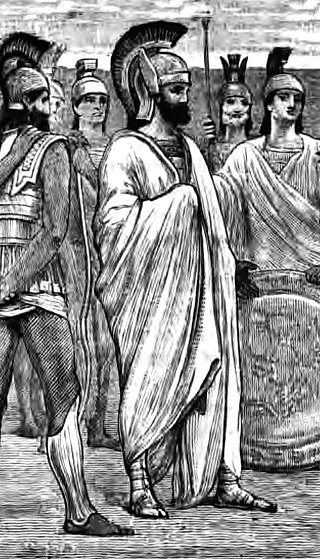
Amyntas III was king of the ancient Greek kingdom of Macedonia from 393/2 to 388/7 BC and again from 387/6 to 370 BC. He was a member of the Argead dynasty through his father Arrhidaeus, a son of Amyntas, one of the sons of Alexander I. His most famous son is Philip II, father of Alexander the Great.

Macedonia, also called Macedon, was an ancient kingdom on the periphery of Archaic and Classical Greece, which later became the dominant state of Hellenistic Greece. The kingdom was founded and initially ruled by the royal Argead dynasty, which was followed by the Antipatrid and Antigonid dynasties. Home to the ancient Macedonians, the earliest kingdom was centered on the northeastern part of the Greek peninsula, and bordered by Epirus to the southwest, Illyria to the northwest, Paeonia to the north, Thrace to the east and Thessaly to the south.
This article concerns the period 369 BC – 360 BC
This article concerns the period 359 BC – 350 BC.

Philip II of Macedon was the king (basileus) of the ancient kingdom of Macedonia from 359 BC until his death in 336 BC. He was a member of the Argead dynasty, founders of the ancient kingdom, and the father of Alexander the Great.

Perdiccas II was the king of Macedonia from 454 BC until his death in 413 BC. During the Peloponnesian War, he frequently switched sides between Sparta and Athens.

Olynthus is an ancient city in present-day Chalcidice, Greece. It was built mostly on two flat-topped hills 30–40m in height, in a fertile plain at the head of the Gulf of Torone, near the neck of the peninsula of Pallene, about 2.5 kilometers from the sea, and about 60 stadia from Poteidaea.
Bardylis was an Illyrian king, and the founder of the first attested Illyrian dynasty. During his reign, Bardylis aimed to make Illyria a regional power interfering with Macedon. He united many southern Illyrian tribes under his realm and defeated the Macedonians and Molossians several times, expanding his dominion over Upper Macedonia, including Lynkestis, and ruling over Macedon through a puppet king. Before the Rise of Macedon Illyrians were the dominant power in the region. Bardylis also led raids against Epirus, but his soldiers were eventually expelled from the region.

Alexander II was king of the ancient Greek kingdom of Macedon from around 370 BC until his death in 368 BC. He was a member of the Argead dynasty through his father Amyntas III.
Eurydice was an Ancient Macedonian queen and wife of king Amyntas III of Macedon.
The Olynthiacs were three political speeches, all delivered by the Athenian statesman and orator Demosthenes. In 349 BC, Philip II of Macedon attacked Olynthus, which at the time was an ally of Athens. In the Olynthiacs, delivered in 349 BC, Demosthenes urged Athens to help Olynthus.
Argaeus II was a pretender to the Macedonian crown. He may have been a Lynkestian ruler.

The Chalcidian League, also referred to as the Olynthians or the Chalcidians in Thrace to distinguish them from the Chalcidians in Euboea, was a federal state that existed on the Chalcidice peninsula, on the shores of the northwest Aegean Sea, from around 430 BCE until it was destroyed by Philip II of Macedon in 348 BCE.

Under the reign of Philip II, the ancient kingdom of Macedonia, initially at the periphery of classical Greek affairs, came to dominate Ancient Greece in the span of just 25 years, largely thanks to the character and policies of its king. In addition to utilising effective diplomacy and marriage alliances to achieve his political aims, Philip II was responsible for reforming the ancient Macedonian army into an effective fighting force. The Macedonian phalanx became the hallmark of the Macedonian army during his reign and the subsequent Hellenistic period. His army and engineers also made extensive use of siege engines. Chief among Philip's Thracian enemies was the ruler Kersebleptes, who may have coordinated a temporary alliance with Athens. In a series of campaigns stretching from 356 to 340 BC, Philip II managed to ultimately subjugate Kersebleptes as a tributary vassal, conquering much of Thrace in the process. Philip II also fought against the Illyrian king Bardylis, who threatened Macedonia proper, and against Grabos II and Pleuratus in Illyria. In his newly conquered territories, he founded new cities such as Philippi, Philippopolis, Herakleia Sintike, and Herakleia Lynkestis.

The Antigonid Macedonian army was the army that evolved from the ancient Greek kingdom of Macedonia in the period when it was ruled by the Antigonid dynasty from 276 BC to 168 BC. It was seen as one of the principal Hellenistic fighting forces until its ultimate defeat at Roman hands at the Battle of Pydna in 168 BC. However, there was a brief resurgence in 150-148 during the revolt of Andriscus, a supposed heir to Perseus.
Sirras or Sirrhas was the son-in-law of the king of Lynkestis, Arrhabaeus, having married his daughter Irra. He participated in an Illyrian-Lynkestian coalition's defeat of the attempted invasion of Lynkestis by the Macedonian king Archelaus. He may have been a Lynkestian prince-regent or an Illyrian chieftain, part of the Illyrian force in a previous and also successful Illyrian-Lynkestian coalition against Sparta and Macedon during the Peloponnesian War.
The Illyrians were a group of Indo-European speaking peoples, who inhabited the western Balkan Peninsula in ancient times. They constituted one of the three main Paleo-Balkan populations, along with the Thracians and Greeks.

The Battle of Erigon Valley or the Battle of Lyncus Plain took place in 358 BC between the Illyrians under Bardyllis and the Macedonians under Philip II. After forty years on continuous Illyrian dominance and expansion under Bardyllis, Philip II after marrying Audata, an Illyrian princess, marched into Illyria and confronted the Illyrian tribesmen. The battle described by Diodorus and Frontinus shows the power and excellence of both the Macedonian and Illyrian armies.

The kingdom of Macedonia was an ancient state in what is now the Macedonian region of northern Greece, founded in the mid-7th century BC during the period of Archaic Greece and lasting until the mid-2nd century BC. Led first by the Argead dynasty of kings, Macedonia became a vassal state of the Achaemenid Empire of ancient Persia during the reigns of Amyntas I of Macedon and his son Alexander I of Macedon. The period of Achaemenid Macedonia came to an end in roughly 479 BC with the ultimate Greek victory against the second Persian invasion of Greece led by Xerxes I and the withdrawal of Persian forces from the European mainland.

The First Olynthian War 382-379 BC. War of Sparta, Macedonia and their allies against the polis Chalcidian League, led by Olynthus.